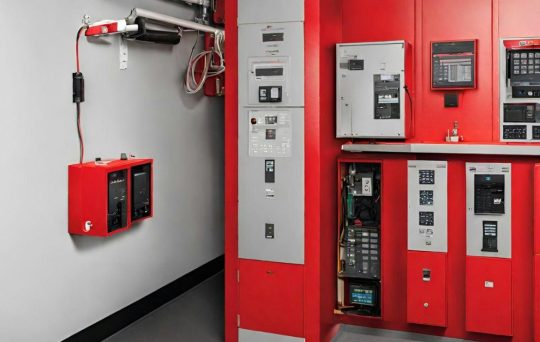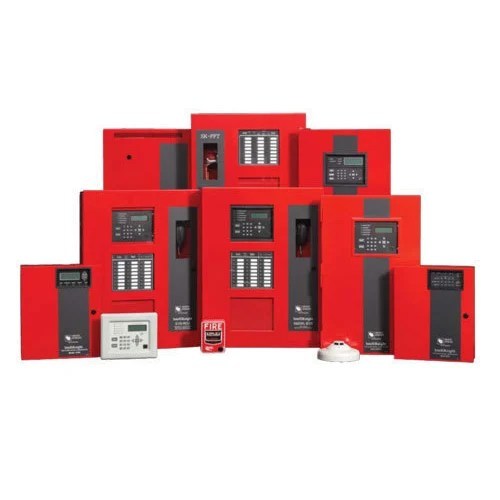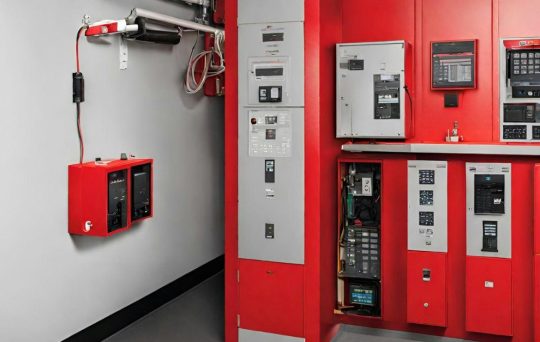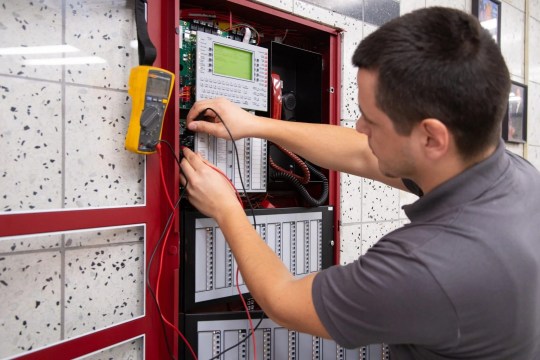#fire safety audit
Explore tagged Tumblr posts
Text

Aagni Fire Agencies Pvt Ltd offers comprehensive Fire Safety Audits, including Form 'A' and 'B' issuance, premises audits per NBC/NFPA standards, fire system performance audits, and safety audits with detailed reports and action plans.
0 notes
Text
Fire Safety Matters: Trust CDG Inspection Limited to Keep You Safe!

"🔥✨ Don't leave your safety to chance. Our Fire Safety Audit is your key to a secure environment. From risk assessment to compliance checks, we're here to ensure your peace of mind.
With our comprehensive audit services, we evaluate every aspect of your fire safety measures, including:
Examination of fire detection systems
Assessment of emergency evacuation procedures
Inspection of fire extinguishers and other firefighting equipment
Verification of compliance with local fire safety regulations
But that's not all! We go beyond the basics to provide personalized recommendations tailored to your specific needs and circumstances. Whether it's updating outdated equipment, improving evacuation routes, or enhancing employee training, we'll work with you to create a custom fire safety plan that maximizes protection and minimizes risk.
Stay protected and prepared for any emergency with CDG Inspection Limited by your side. Don't wait until it's too late – schedule your Fire Safety Audit today!
Call us: +91-9643077962 Mail us at: [email protected] Website: www.cdginspection.com
0 notes
Text
0 notes
Text
Fire Safety Audit Services in India
🔥🚒 Safety should always be a top priority, especially when it comes to fire hazards. Our Fire Safety Audit Services in India provide comprehensive assessments to keep your workplace secure. Don't wait for an emergency to strike, take proactive steps today! Contact us today!
Contact us now for a consultation. ☎️
📲9716667972, 9650334786
🌐https://inventumpower.com/fire-safety-audit
0 notes
Text
Conducting a Comprehensive Fire Safety Audit for Your Business with RAS Safety

Fire safety is crucial for any business, as it helps prevent property damage, injury, and loss of life. Conducting a fire safety audit is a crucial step in ensuring that your business is prepared for any fire-related emergencies. At RAS Safety, we specialize in providing comprehensive fire safety audits that help identify potential fire hazards, ensure compliance with local fire codes, and establish a robust fire safety plan.
0 notes
Text
Fire safety is a crucial aspect of any building or facility and it is essential to regularly conduct fire safety audits to ensure that the premises are compliant with fire safety regulations and standards. A fire safety audit is a comprehensive examination and evaluation of the building or facility to identify potential fire hazards and to ensure that the building is equipped with adequate fire protection measures.
#electrical contractor in kolkata#Best Fire Safety Audit Service Provider Kolkata#engineering company#fire audit report#electrical audit report#electrical safety audit#electrical consultants#electrical auditor#electrical audit#thermography test#thermography audit#energy auditor#electrical consultant#thermography electrical#fire safety audit#electrical construction company in kolkata#energy auditors in bangalore#consultant electrical engineer#electronics manufacturing companies in kolkata#electrical consultant in bangalore#delhi electrical company#licensed electrical contractor near me#electrical consultants in navi mumbai#electrical consultants in india#electrical audit checklist#electrical audit of building#electrical safety certificate#electrical project contractors in kolkata#electrical project company in kolkata#licensed electrical contractor
0 notes
Text
Fire Safety Audit: Safeguarding Your Premises with Aagni Fire Agencies Pvt Ltd

In today’s world, fire safety is paramount for any organization, and ensuring compliance with fire safety regulations is a critical aspect of operational safety. Aagni Fire Agencies Pvt Ltd provides top-notch Fire Safety Audits across Mumbai, Thane, Navi Mumbai, Kalyan, and Bhiwandi. Their comprehensive audit services help ensure that businesses meet necessary safety standards and are well-prepared to tackle any potential fire hazards.
Comprehensive Fire Safety Audits
Aagni Fire conducts audits tailored to the specific needs of your premises, ensuring adherence to the National Building Code (NBC), National Fire Protection Association (NFPA) standards, and the Maharashtra Fire Prevention & Life Safety Measures (MFPLSM) Act. Their audits cover every aspect of fire safety, from the adequacy of equipment to the overall preparedness of your fire response systems.
Key Services:
Authorized Issuance of Compliance Forms Aagni Fire provides the necessary paperwork, such as Form 'A' and Form 'B,' to certify that your facility is compliant with fire safety regulations. These forms are crucial for legal compliance and safeguarding your business against penalties.
Premises Audits Experts from Aagni Fire evaluate your premises thoroughly, assessing whether they meet fire safety norms. By following NBC, NFPA, and MFPLSM Act guidelines, they ensure that your property is not only compliant but also safe for its occupants.
Fire System Performance Audits During this evaluation, Aagni Fire assesses the current state of your fire safety systems, including alarms, sprinklers, and extinguishers. If any inefficiencies or issues are found, they provide recommendations for upgrades or improvements, ensuring the utmost safety.
Safety Audits as per Company’s Act Compliance with the Company’s Act is a legal obligation for businesses. Aagni Fire’s audits help you remain compliant by identifying any gaps in fire safety measures and providing actionable insights to address those deficiencies.
Benefits of Aagni Fire’s Audits
Compliance Assurance Ensure your premises meet the fire safety standards of NBC, NFPA, and MFPLSM Act, protecting your business from potential legal issues.
Risk Mitigation Early identification of fire hazards through a professional audit can prevent accidents and loss, keeping both people and property safe.
Enhanced Safety By improving the effectiveness of your fire safety systems, Aagni Fire ensures that your premises are better prepared to handle emergencies.
Regulatory Adherence Avoid fines and legal troubles by complying with the Company’s Act through a thorough audit process.
Detailed Reporting Aagni Fire provides in-depth reports and recommendations, helping you take proactive steps toward fire safety improvement.
1 note
·
View note
Text

🔥 Elevate Your Safety Game with CDG Inspection Limited's Fire Safety Audit! 🔥
At CDG Inspection Limited, safety is our passion! Introducing our Fire Safety Audit service, ensuring your peace of mind. 🚨✅
Why CDG? 🔍 Expert Team: Skilled pros with years of experience. 🛡️ Compliance: We ensure you meet all fire safety regulations. 🔥 Thoroughness: No hazard left unchecked!
What's Included? 🔦 Evaluation of alarm systems 🚨 Inspection of emergency signage 🧯 Assessment of extinguishers 🚪 Review of evacuation plans
Benefits: 🔒 Reduce fire risks 💼 Ensure regulatory compliance 💰 Protect your investments
Don't wait! Schedule your audit today for a safer tomorrow. 📆✨
Call us: +91-9643077962 Mail us at: [email protected] Website: www.cdginspection.com
0 notes
Text
Installation of Fire Alarm Systems

Installation of Fire Alarm Systems

1. Importance of Fire Alarm Systems
The importance of fire alarm systems is evident in several aspects:
Protection from Hazards: They alert individuals in case of a fire, providing sufficient time to evacuate the building.
Reducing Financial Losses: Early detection of fire can minimize material damage and aid in preserving property.
Compliance with Legal Requirements: In many countries, installing fire alarm systems is mandatory in public and commercial buildings.
2. Types of Fire Alarm Systems
Fire alarm systems include several types, such as:
Manual Alarm Systems: Such as manual pull stations activated by individuals during an emergency.
Automatic Alarm Systems: These rely on sensors to detect smoke or heat and automatically issue alerts.
3. Steps for Installing Fire Alarm Systems
The steps for installing fire alarm systems can be summarized as follows:
Initial Assessment: Evaluate the building and identify the most vulnerable areas.
Choosing the Appropriate System: Select the suitable type of system based on the building’s needs.
Installation: Install sensors, alarms, and control panels professionally.
Testing and Confirmation: After installation, the system must be tested to ensure efficient operation.
4. Regular Maintenance
To ensure the continuous operation of the fire alarm system, regular maintenance is crucial. Maintenance includes:
Sensor Checks: Ensure their effectiveness and proper functioning.
Device Testing: Verify that all alarms operate correctly.
System Updates: Consider updating the system to keep pace with technological advancements.

5. Choosing a Professional Installation Company
It’s important to choose a reliable company for installing fire alarm systems. The company should have:
Experience: A long history in installing and maintaining alarm systems.
Licensing: Be licensed and certified by official authorities.
After-Sales Service: Provide support and maintenance services post-installation.
Installing fire alarm systems is a crucial step in protecting lives and property. The right system and professional installation ensure the system’s effectiveness. Don’t hesitate to contact Bidaya Company for a free consultation and reliable installation services.
Installation of Fire Alarm Systems
Fire alarm systems are among the most important safety elements in buildings, playing a vital role in protecting lives and property. Therefore, installing these systems is a complex process requiring expertise and technical knowledge. Here are additional details about installing fire alarm systems.
1. System Design
Before starting the installation process, the fire alarm system must be designed based on several factors, such as:
Building Size: Larger buildings require more complex systems that include multiple sensors and alarms.
Building Usage: The system design varies depending on the building’s purpose (residential, commercial, industrial).
Construction Materials: The materials used in the building affect how smoke and heat spread, impacting sensor installation locations.
2. Types of Sensors
Fire alarm sensors differ based on how they detect fire:
Smoke Sensors: Detect smoke particles in the air and vary between ionization and photoelectric smoke sensors.
Heat Sensors: Detect abnormal increases in temperature and include fixed and two-point sensors.
Flame Sensors: Detect flames using infrared or visible light and are effective in environments where high temperatures can cause false alarms.
3. Control Panels
Central control panels are essential components of the fire alarm system. They manage all sensors and alarms and include:
System Status Display: Shows the status of each sensor in the system, indicating whether it is in normal operation or detecting a fire.
Interaction Capabilities: Allow the user to interact with alerts and manually control the system.
Event Logging and Documentation: Some panels have event logging features, allowing for tracking and documenting any alerts that occur.
4. Safety Procedures During Installation
When installing a fire alarm system, it’s essential to adhere to several safety procedures to avoid any risks, including:
Power Shutdown: Ensure that all electrical systems are turned off during installation to avoid electrical shocks.
Using Appropriate Equipment: Utilize suitable installation tools and equipment to prevent damage to any components during installation.
Providing Adequate Ventilation: If using chemicals or adhesives, ensure proper ventilation to avoid inhaling harmful substances.

5. Training and Awareness
After installing the fire alarm system, training for workers or residents in the building on how to use the system is vital. Training includes:
Recognizing Fire Alarms: Clarifying how to recognize alarm signals and the importance of rapid response.
Evacuation Plans: Explaining the evacuation plan in case of fire, including safe routes and designated meeting areas.
6. Modern Technologies in Fire Alarm Systems
Modern technologies used in fire alarm systems include:
Integration with Other Security Systems: Such as surveillance and cameras, providing an additional level of security.
Alerts via Smartphones: Sending instant alerts to mobile devices in case of fire, allowing for quick action.
Artificial Intelligence Systems: Using AI to analyze data for detecting patterns and potential threats.
Installing fire alarm systems requires technical knowledge and high expertise to ensure their effective operation. It is essential to choose a reliable company like Bidaya Company to ensure the installation of a comprehensive system that complies with international safety standards and achieves maximum security.
Installation of Fire Alarm Systems
The installation of fire alarm systems is a vital step in enhancing safety within any building. These systems require careful planning and a deep understanding of the available technologies. In this context, we will delve into more details about installing fire alarm systems, along with keywords that enhance the article’s visibility in search engines.
1. Preliminary Planning for System Design
Before commencing the installation process, specialists should conduct a comprehensive site assessment. This includes:
Studying the Building Layout: Analyzing the layout to identify the most critical points for sensor installation, such as hallways, rooms, and enclosed spaces.
Identifying Hazard Sources: Pinpointing potential fire outbreak locations, such as kitchens and storage areas, to ensure nearby sensors are installed.

2. Modern Detection Technologies
Modern technologies used in fire alarm systems employ advanced methods to improve detection accuracy, including:
Advanced Sensors: Such as smart sensors capable of distinguishing between smoke from a fire and smoke from cooking.
Nano Technology: Utilizing it to develop lightweight and compact sensors that enhance system effectiveness.
3. Integration with Other Security Systems
Integrating fire alarm systems with other security systems in the facility provides an additional level of protection:
Automatic Fire Suppression Systems: Can work in tandem with alarms to extinguish fire in its early stages.
Audible Alarm Systems: Alert people inside the building to evacuate and can be connected to a public address system.
4. Installation Guidelines
When installing fire alarm systems, a set of guidelines must be followed to ensure efficient installation:
Avoid Interference: Sensors should be installed away from excessive heat sources, such as electric bulbs.
Consider Heights: Determine the appropriate height for sensor installation based on their type. For example, smoke sensors should be installed 30-60 cm from the ceiling.
Correct Orientation: Position sensors effectively toward areas where smoke accumulates.
5. Performance Testing
After installation, comprehensive performance tests should be conducted to verify the system’s effectiveness:
Simulation Tests: Simulate fire scenarios using artificial smoke to ensure the system responds appropriately.
Performance Evaluation: Measure the sensors’ response time and accuracy in detecting fire locations.
6. Periodic Maintenance Strategies
Fire alarm systems require regular maintenance to ensure ongoing efficiency:
Schedule Inspections: Develop a plan to inspect systems periodically, at least once every six months.
System Updates: Consider updating the system in line with the latest available technologies.

Keywords
Installation of fire alarm systems
Fire protection
Automatic alarm systems
Smoke sensors
Fire system maintenance
Fire detection technologies
Integrated security systems
Importance of alarm systems
Fire system performance testing
Design of fire alarm systems
The installation of fire alarm systems requires dedication and high technical knowledge. Ensure to choose a professional company like Bidaya Company to guarantee an effective system installation that achieves the highest safety standards. If you have any inquiries or need consultation, please do not hesitate to contact us!
#Top-rated fire safety services Dammam#Professional fire suppression system installation Jeddah#Fire safety audits and system installation Jubail#Fire fighting network installation company near me#Certified fire alarm system installers Riyadh#Affordable fire protection installation Medina
0 notes
Text
Installation of Fire Alarm Systems

Installation of Fire Alarm Systems

1. Importance of Fire Alarm Systems
The importance of fire alarm systems is evident in several aspects:
Protection from Hazards: They alert individuals in case of a fire, providing sufficient time to evacuate the building.
Reducing Financial Losses: Early detection of fire can minimize material damage and aid in preserving property.
Compliance with Legal Requirements: In many countries, installing fire alarm systems is mandatory in public and commercial buildings.
2. Types of Fire Alarm Systems
Fire alarm systems include several types, such as:
Manual Alarm Systems: Such as manual pull stations activated by individuals during an emergency.
Automatic Alarm Systems: These rely on sensors to detect smoke or heat and automatically issue alerts.
3. Steps for Installing Fire Alarm Systems
The steps for installing fire alarm systems can be summarized as follows:
Initial Assessment: Evaluate the building and identify the most vulnerable areas.
Choosing the Appropriate System: Select the suitable type of system based on the building’s needs.
Installation: Install sensors, alarms, and control panels professionally.
Testing and Confirmation: After installation, the system must be tested to ensure efficient operation.
4. Regular Maintenance
To ensure the continuous operation of the fire alarm system, regular maintenance is crucial. Maintenance includes:
Sensor Checks: Ensure their effectiveness and proper functioning.
Device Testing: Verify that all alarms operate correctly.
System Updates: Consider updating the system to keep pace with technological advancements.

5. Choosing a Professional Installation Company
It’s important to choose a reliable company for installing fire alarm systems. The company should have:
Experience: A long history in installing and maintaining alarm systems.
Licensing: Be licensed and certified by official authorities.
After-Sales Service: Provide support and maintenance services post-installation.
Installing fire alarm systems is a crucial step in protecting lives and property. The right system and professional installation ensure the system’s effectiveness. Don’t hesitate to contact Bidaya Company for a free consultation and reliable installation services.
Installation of Fire Alarm Systems
Fire alarm systems are among the most important safety elements in buildings, playing a vital role in protecting lives and property. Therefore, installing these systems is a complex process requiring expertise and technical knowledge. Here are additional details about installing fire alarm systems.
1. System Design
Before starting the installation process, the fire alarm system must be designed based on several factors, such as:
Building Size: Larger buildings require more complex systems that include multiple sensors and alarms.
Building Usage: The system design varies depending on the building’s purpose (residential, commercial, industrial).
Construction Materials: The materials used in the building affect how smoke and heat spread, impacting sensor installation locations.
2. Types of Sensors
Fire alarm sensors differ based on how they detect fire:
Smoke Sensors: Detect smoke particles in the air and vary between ionization and photoelectric smoke sensors.
Heat Sensors: Detect abnormal increases in temperature and include fixed and two-point sensors.
Flame Sensors: Detect flames using infrared or visible light and are effective in environments where high temperatures can cause false alarms.
3. Control Panels
Central control panels are essential components of the fire alarm system. They manage all sensors and alarms and include:
System Status Display: Shows the status of each sensor in the system, indicating whether it is in normal operation or detecting a fire.
Interaction Capabilities: Allow the user to interact with alerts and manually control the system.
Event Logging and Documentation: Some panels have event logging features, allowing for tracking and documenting any alerts that occur.
4. Safety Procedures During Installation
When installing a fire alarm system, it’s essential to adhere to several safety procedures to avoid any risks, including:
Power Shutdown: Ensure that all electrical systems are turned off during installation to avoid electrical shocks.
Using Appropriate Equipment: Utilize suitable installation tools and equipment to prevent damage to any components during installation.
Providing Adequate Ventilation: If using chemicals or adhesives, ensure proper ventilation to avoid inhaling harmful substances.

5. Training and Awareness
After installing the fire alarm system, training for workers or residents in the building on how to use the system is vital. Training includes:
Recognizing Fire Alarms: Clarifying how to recognize alarm signals and the importance of rapid response.
Evacuation Plans: Explaining the evacuation plan in case of fire, including safe routes and designated meeting areas.
6. Modern Technologies in Fire Alarm Systems
Modern technologies used in fire alarm systems include:
Integration with Other Security Systems: Such as surveillance and cameras, providing an additional level of security.
Alerts via Smartphones: Sending instant alerts to mobile devices in case of fire, allowing for quick action.
Artificial Intelligence Systems: Using AI to analyze data for detecting patterns and potential threats.
Installing fire alarm systems requires technical knowledge and high expertise to ensure their effective operation. It is essential to choose a reliable company like Bidaya Company to ensure the installation of a comprehensive system that complies with international safety standards and achieves maximum security.
Installation of Fire Alarm Systems
The installation of fire alarm systems is a vital step in enhancing safety within any building. These systems require careful planning and a deep understanding of the available technologies. In this context, we will delve into more details about installing fire alarm systems, along with keywords that enhance the article’s visibility in search engines.
1. Preliminary Planning for System Design
Before commencing the installation process, specialists should conduct a comprehensive site assessment. This includes:
Studying the Building Layout: Analyzing the layout to identify the most critical points for sensor installation, such as hallways, rooms, and enclosed spaces.
Identifying Hazard Sources: Pinpointing potential fire outbreak locations, such as kitchens and storage areas, to ensure nearby sensors are installed.

2. Modern Detection Technologies
Modern technologies used in fire alarm systems employ advanced methods to improve detection accuracy, including:
Advanced Sensors: Such as smart sensors capable of distinguishing between smoke from a fire and smoke from cooking.
Nano Technology: Utilizing it to develop lightweight and compact sensors that enhance system effectiveness.
3. Integration with Other Security Systems
Integrating fire alarm systems with other security systems in the facility provides an additional level of protection:
Automatic Fire Suppression Systems: Can work in tandem with alarms to extinguish fire in its early stages.
Audible Alarm Systems: Alert people inside the building to evacuate and can be connected to a public address system.
4. Installation Guidelines
When installing fire alarm systems, a set of guidelines must be followed to ensure efficient installation:
Avoid Interference: Sensors should be installed away from excessive heat sources, such as electric bulbs.
Consider Heights: Determine the appropriate height for sensor installation based on their type. For example, smoke sensors should be installed 30-60 cm from the ceiling.
Correct Orientation: Position sensors effectively toward areas where smoke accumulates.
5. Performance Testing
After installation, comprehensive performance tests should be conducted to verify the system’s effectiveness:
Simulation Tests: Simulate fire scenarios using artificial smoke to ensure the system responds appropriately.
Performance Evaluation: Measure the sensors’ response time and accuracy in detecting fire locations.
6. Periodic Maintenance Strategies
Fire alarm systems require regular maintenance to ensure ongoing efficiency:
Schedule Inspections: Develop a plan to inspect systems periodically, at least once every six months.
System Updates: Consider updating the system in line with the latest available technologies.

Keywords
Installation of fire alarm systems
Fire protection
Automatic alarm systems
Smoke sensors
Fire system maintenance
Fire detection technologies
Integrated security systems
Importance of alarm systems
Fire system performance testing
Design of fire alarm systems
The installation of fire alarm systems requires dedication and high technical knowledge. Ensure to choose a professional company like Bidaya Company to guarantee an effective system installation that achieves the highest safety standards. If you have any inquiries or need consultation, please do not hesitate to contact us!
#Top-rated fire safety services Dammam#Professional fire suppression system installation Jeddah#Fire safety audits and system installation Jubail#Fire fighting network installation company near me#Certified fire alarm system installers Riyadh#Affordable fire protection installation Medina
0 notes